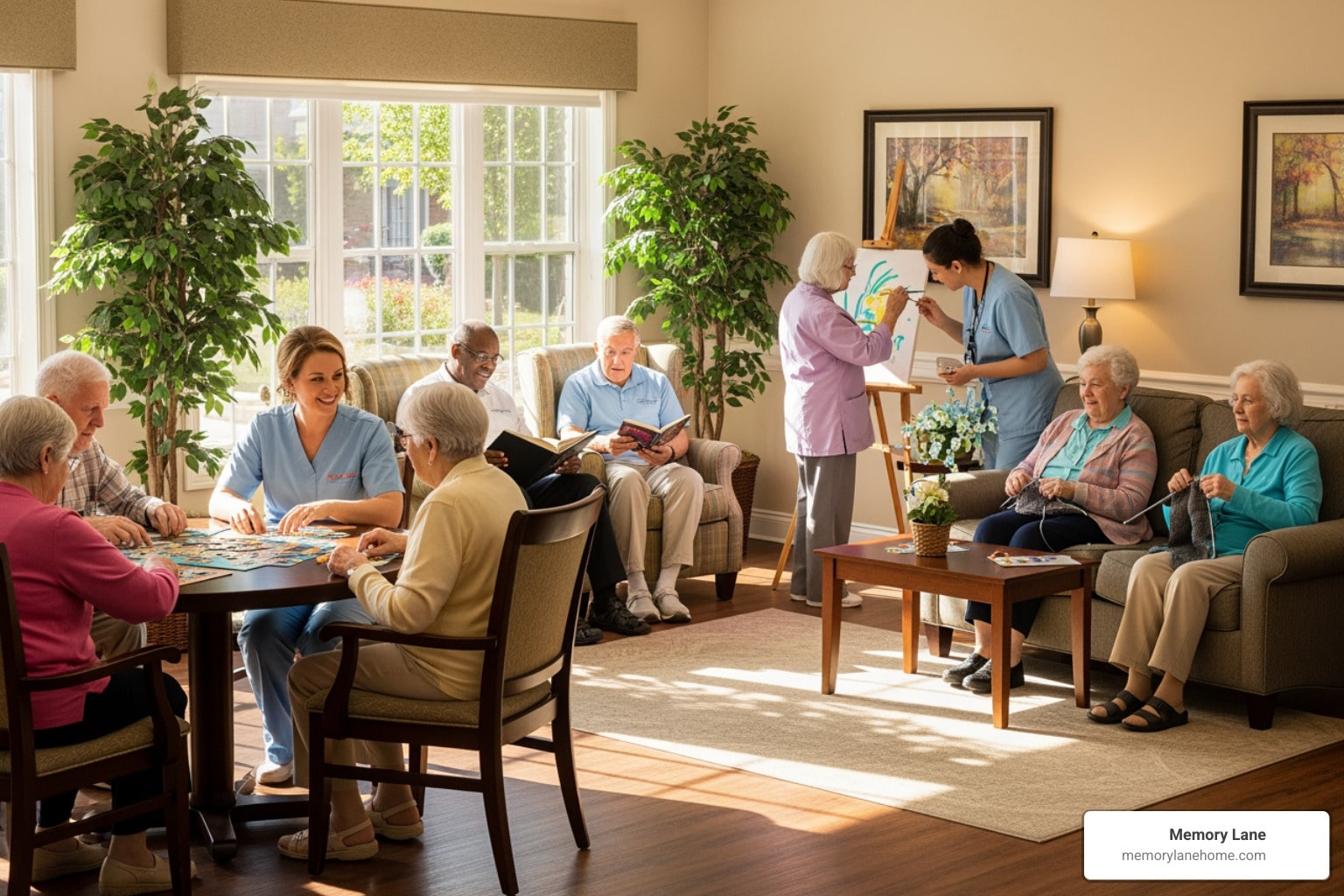Your guide to assisted living Michigan: explore costs, services, financial aid, and top communities for senior care.

Alzheimer’s Support Services Near Me Explained
Alzheimer’s Support Services Near Me Explained

Finding Local Alzheimer’s Support Services & Memory Care Facilities

Understanding Alzheimer’s support services near you is essential when seeking compassionate, specialized care for a loved one with dementia. This guide defines Alzheimer’s and dementia, explains memory care offerings, and shows how to find top-rated facilities locally. You’ll learn what services include, how to compare assisted living and memory care, evaluate cost and financial aid, access caregiver resources, recognize early warning signs, navigate Medicaid eligibility in Michigan, and discover why Memory Lane Home in Ypsilanti and Ann Arbor stands out for personalized, home-like memory care.
What Are Alzheimer’s and Dementia? Understanding the Conditions Behind Memory Care
Alzheimer’s and dementia are progressive neurological conditions that impair memory, cognitive function, and daily living skills, creating increasing care needs that specialized memory care services address through structured routines and secure environments. This foundation clarifies why targeted support matters.
What Is Alzheimer’s Disease and How Does It Affect Seniors?
Alzheimer’s disease is a degenerative brain disorder characterized by neuronal death and amyloid plaque accumulation, leading to memory loss, confusion, and impaired judgment that undermine independence and quality of life. Early symptoms include forgetfulness and difficulty learning new information, while later stages involve significant disorientation and loss of self-care abilities. Recognizing these changes lays the groundwork for evaluating care options.
Understanding Alzheimer’s Disease
Alzheimer’s disease is a progressive brain disorder characterized by the accumulation of amyloid plaques and tau tangles, leading to memory loss, confusion, and impaired judgment. These changes undermine independence and quality of life for those affected.
This citation provides a foundational understanding of the disease discussed in the article.
What Are the Different Types of Dementia?
Dementia is an umbrella term for cognitive decline syndromes, including:
- Alzheimer’s Disease – marked by amyloid plaques and tau tangles causing memory and language impairment.
- Vascular Dementia – resulting from reduced blood flow to the brain, leading to stepwise cognitive decline.
- Lewy Body Dementia – involving abnormal protein deposits that cause fluctuating cognition, visual hallucinations, and motor symptoms.
- Frontotemporal Dementia – characterized by frontal lobe atrophy leading to personality changes and executive function deficits.
Each subtype demands tailored care approaches, informing facility selection criteria and therapeutic programming.
What Are the Common Signs That Indicate Memory Care Is Needed?
Memory care becomes necessary when an individual exhibits:
- Frequent Disorientation – getting lost in familiar settings or forgetting routes.
- Decline in Daily Living Activities – inability to manage hygiene, meals, or medications safely.
- Unsafe Behaviors – wandering, leaving appliances on, or poor judgment in risky situations.
- Emotional and Social Withdrawal – increased anxiety, agitation, or isolation impacting well-being.
Spotting these indicators prompts timely transition to supportive environments that reduce risks and enhance quality of life, leading naturally into an exploration of memory care services.
What Are Memory Care Services and How Do They Support Alzheimer’s Patients?

Memory care services deliver specialized programs and secure living environments designed to maintain cognitive function, promote engagement, and ensure safety for individuals with Alzheimer’s and other dementias.
What Makes Memory Care Different from Assisted Living?
The table below compares key features:
This comparison clarifies why families choose memory care when specialized safety and cognitive support outweigh general assistance needs. Understanding these distinctions leads into how personalized care improves daily life.
How Does Personalized Care Improve Quality of Life in Memory Care Facilities?
Personalized care plans assess each resident’s history, preferences, and abilities to create tailored routines that:
- Reinforce familiar rituals and life stories to preserve identity.
- Adapt dining options to taste preferences and dietary needs for proper nutrition.
- Schedule one-on-one engagement sessions reducing agitation and building trust.
By aligning care with individual needs, facilities foster emotional well-being and slower functional decline, which segues into the importance of safety and security features.
What Safety and Security Features Are Essential in Memory Care Homes?
Effective memory care environments integrate multiple safeguards:
- Wandering Prevention Systems – electronic door alarms and secure perimeters.
- 24/7 Supervision – continuous staff presence to monitor behaviors and emergencies.
- Fall-Resistant Design – handrails, non-slip flooring, and clear pathways.
- Emergency Response Protocols – coordinated plans for medical and behavioral crises.
These measures minimize risks and enable families to trust that loved ones remain protected, inviting a look at the engaging activities that enrich daily living.
What Daily Activities and Therapies Are Offered to Engage Residents?
Memory care facilities provide structured programs that promote cognitive, physical, and social health:
- Music and Art Therapy – evokes memories and stimulates communication.
- Reminiscence Groups – sharing life stories enhances social bonds and identity.
- Physical Exercise Classes – gentle movement preserves mobility and balance.
- Cognitive Games and Puzzles – challenges executive functions and memory recall.
These activities support meaningful engagement and quality of life, building the case for how families can find and choose the right facility nearby.
How to Find and Choose the Best Memory Care Facility Near Me?
What Criteria Should Families Use to Evaluate Memory Care Facilities?
When touring options, assess:
- Staff Training and Certifications – dementia-specific credentials and ongoing education.
- Caregiver-to-Resident Ratio – lower ratios enable prompt response and personalized attention.
- Program Variety – availability of therapeutic activities tailored to cognitive levels.
- Facility Ambiance – home-like décor and comfortable communal spaces.
- Safety Infrastructure – secure entry/exit protocols and emergency systems.
Focusing on these factors clarifies which settings best match a loved one’s needs and transitions to exploring the benefits of high staffing levels.
How Does a High Caregiver-to-Resident Ratio Benefit Residents?
A high caregiver-to-resident ratio ensures:
- Prompt Assistance – immediate support with meals, hygiene, and mobility needs.
- Enhanced Observation – early detection of health changes or behavioral shifts.
- Personalized Engagement – ability to adapt activities to individual interests.
- Stronger Relationships – consistent assignments build trust and emotional security.
These advantages illustrate why staffing levels are a cornerstone of quality memory care, leading into the practical considerations for facility tours.
What Questions Should You Ask During a Facility Tour?
During your visit, inquire:
- “How are care plans created and updated for each resident?”
- “What emergency and medical protocols are in place for wandering or falls?”
- “How do you accommodate dietary restrictions and preferences?”
- “Can you describe a typical day’s schedule for memory care residents?”
Asking these targeted questions yields insight into daily operations and resident experiences, preparing families to compare options based on cost and financial support.
How Much Does Memory Care Cost and What Financial Assistance Is Available?
What Is the Average Cost of Memory Care in Michigan and Local Areas?
Memory care in Michigan averages $5,300 per month, with Ypsilanti rates slightly below and Ann Arbor rates often 10–20 percent higher. This cost covers room, board, personalized care, and structured activities. Comparing local pricing ensures accurate budgeting and prompts exploration of Medicaid eligibility next.
Does Medicaid Cover Memory Care Services in Michigan?
Medicaid may cover memory care costs for eligible seniors through state programs when nursing-home levels of care are required. Coverage requires:
Medicaid Coverage for Memory Care
Medicaid may cover memory care costs for eligible seniors through state programs when nursing-home levels of care are required. Coverage requires income and asset assessments meeting state criteria, physician documentation of dementia diagnosis, and enrollment in specific programs.
This citation clarifies the requirements for Medicaid coverage, which is a key topic in the article.
What Other Funding Options Are Available for Alzheimer’s Care?
Beyond Medicaid, families can consider:
- Veterans Aid & Attendance Benefits – supplemental payment for qualified veterans and spouses.
- Long-Term Care Insurance – policies that cover memory care based on plan provisions.
- Life Insurance Conversion – converting cash-value policies into care benefits.
- State and Local Grants – Washtenaw County programs supporting senior services.
Exploring these avenues complements Medicaid and eases financial burdens, leading naturally into emotional and practical support resources for caregivers.
What Support Resources Are Available for Families and Caregivers of Alzheimer’s Patients?
How Can Caregiver Support Groups Help Manage Stress and Burnout?

Support groups offer:
- Peer Connection – sharing experiences reduces isolation and fosters empathy.
- Education Workshops – expert-led sessions on behavioral management and self-care.
- Respite Referrals – information on short-term relief care options.
- Emotional Validation – safe spaces to express grief, frustration, and hope.
Engaging with peers and professionals builds coping skills that translate into better care environments, preparing caregivers to apply practical tips next.
What Are Practical Tips for Coping with Caregiver Challenges?
Effective strategies include:
- Scheduled Self-Care – allocate daily time for rest, hobbies, or exercise.
- Task Delegation – enlist family members or professional aides for specific duties.
- Stress-Reduction Techniques – mindfulness, deep breathing, or counseling.
- Routine Establishment – consistent schedules reduce unpredictability and anxiety.
Implementing these practices sustains caregiver health and enhances the home-to-facility transition when care needs escalate, pointing families toward local support services.
Where Can Families Find Local Alzheimer’s Support Services in Ypsilanti and Ann Arbor?
Local resources include:
- Washtenaw County Area Agency on Aging – information and referrals for senior services.
- Alzheimer’s Association Michigan Chapter – helpline, education programs, and support groups.
- Ann Arbor Senior Center – dementia-friendly activities and caregiver workshops.
- Memory Lane Home Community Events – regular family forums and educational seminars.
Tapping into these networks enriches the support system and naturally guides families to consider Memory Lane Home’s unique offerings.
What Makes Memory Lane Home a Trusted Choice for Memory Care in Ypsilanti and Ann Arbor?
How Does Memory Lane Home Provide a Home-Like Environment for Residents?
Each six-resident ranch house replicates a family residence with private rooms, communal living areas, and personalized décor to promote familiarity and reduce anxiety. This residential approach nurtures trust and emotional stability, illustrating a core value that sets Memory Lane Home apart.
What Are the Benefits of Small, Six-Resident Memory Care Homes?
Operating in six-bed settings ensures:
- Personalized Attention – staff know each resident’s history, routines, and preferences.
- Strong Community Bonds – close-knit relationships among residents enhance social support.
- Consistent Staffing – familiar caregivers minimize confusion and foster security.
- Flexible Routines – daily schedules adapt to individual rhythms and needs.
These features demonstrate why small-scale homes often yield higher resident satisfaction and better quality of life metrics.
How Does Memory Lane Home Ensure 24/7 Compassionate Care?
Memory Lane Home maintains a high caregiver-to-resident ratio with round-the-clock staffing, specialized dementia training, and on-site RN oversight. This structure enables immediate response to behavioral changes, medical needs, or emergencies, reinforcing families’ confidence in continuous support.
How Can Families Schedule a Tour or Consultation at Memory Lane Home?
To arrange a personalized tour or consultation, families can call the Ypsilanti office to speak with an admissions coordinator, review care plan options, and visit the ranch houses at a convenient time. Experiencing the homelike atmosphere firsthand offers clarity when making care decisions and leads into recognizing early warning signs.
What Are the Early Warning Signs That Indicate It’s Time to Consider Memory Care?
How Do Cognitive and Memory Changes Signal the Need for Care?
Noticeable indicators include:
- Accelerated Forgetfulness – repeatedly asking the same questions or forgetting recent conversations.
- Disorientation Episodes – confusion about date, time, or familiar locations.
- Poor Judgment – mishandling money or succumbing to scams.
Recognizing these cognitive shifts underscores the importance of structured care environments and prepares families to spot behavioral and emotional changes.
What Behavioral and Emotional Changes Should Families Watch For?
Families should observe:
- Increased Agitation or Aggression – verbal outbursts or physical restlessness.
- Social Withdrawal – loss of interest in previously enjoyed activities.
- Mood Swings and Anxiety – sudden crying spells or unexplained fear.
These changes can compromise safety and caregiver capacity, prompting evaluation of home care adequacy.
When Is Home Care No Longer Sufficient for Alzheimer’s Patients?
Home care limitations become apparent when:
- Caregivers experience chronic exhaustion or health decline.
- Behavioral issues pose risks that outpace home modifications.
- Complex medical needs exceed in-home nursing scope.
Identifying this threshold guides families toward professional memory care settings designed to address advanced dementia requirements and leads into understanding Medicaid eligibility processes.
How Does Medicaid Eligibility Work for Memory Care in Michigan?
Michigan Medicaid programs can subsidize memory care costs when recipients meet clinical and financial criteria, offering vital support for long-term care.
What Are the Medicaid Requirements for Memory Care Coverage?
Eligibility requires:
- Income and Asset Limits – income and countable assets under state thresholds.
- Medical Necessity Determination – physician or nurse practitioner documentation of dementia diagnosis and need for nursing-level care.
- Program Enrollment – application to the MIChoice Waiver or nursing facility benefit.
How Can Families Apply for Medicaid and Other State Programs?
To apply, families should:
- Gather Financial Documentation – bank statements, income records, and asset information.
- Obtain Medical Certification – detailed physician reports on cognitive status and care requirements.
- Submit Applications – through the Michigan Department of Health and Human Services (MDHHS) either online or at a local office.
- Follow Up – provide additional information promptly and appeal denials if needed.
Completing this process ensures timely access to benefits, highlighting limitations and coverage specifics next.
What Are the Limitations and Benefits of Medicaid for Memory Care?
Medicaid benefits include comprehensive care coverage for room, board, skilled nursing, and therapies; however, limitations involve:
- Provider Network Restrictions – not all memory care homes accept Medicaid.
- Asset Spend-Down Rules – families may need to use personal resources to qualify.
- Reauthorization Requirements – periodic reviews to maintain eligibility.
Understanding these trade-offs equips families to balance funding options and secure appropriate care placements.
The path from recognizing dementia symptoms to selecting a specialized memory care facility involves informed evaluations, financial planning, and leveraging local resources. Memory Lane Home’s small, home-like environment, high caregiver ratios, and dedicated dementia expertise deliver personalized support that aligns with each resident’s needs. Families benefit from structured programs, secure settings, and compassionate teams trained to enhance quality of life for seniors with Alzheimer’s and related dementias.
Frequently Asked Questions
What should I look for in a memory care facility?
When evaluating memory care facilities, consider factors such as staff training in dementia care, the caregiver-to-resident ratio, and the variety of therapeutic programs offered. Additionally, assess the facility’s ambiance, safety features, and how care plans are tailored to individual needs. Visiting multiple facilities and asking specific questions can help you determine which environment best suits your loved one’s requirements and preferences.
How can I support a loved one transitioning to memory care?
Supporting a loved one during the transition to memory care involves open communication and reassurance. Encourage them to express their feelings about the move, and validate their emotions. Familiarize them with the new environment by visiting together before the move. Establishing a routine and maintaining regular visits can also help ease the adjustment, making them feel more secure and connected to family during this significant change.
What role do family members play in memory care?
Family members play a crucial role in memory care by providing emotional support, participating in care planning, and maintaining communication with staff. Regular visits can help residents feel connected and engaged. Families can also advocate for their loved ones’ needs, share insights about their preferences, and participate in activities offered by the facility, fostering a sense of community and belonging for both residents and their families.
Are there specific activities that benefit Alzheimer’s patients in memory care?
Yes, activities that promote cognitive engagement, social interaction, and physical health are particularly beneficial for Alzheimer’s patients. These may include music and art therapy, reminiscence activities, gentle exercise classes, and cognitive games. Such activities not only stimulate memory and cognitive function but also enhance emotional well-being and foster connections among residents, contributing to a more fulfilling daily experience in memory care settings.
How can I find financial assistance for memory care services?
Financial assistance for memory care services can be found through various avenues. Medicaid may cover costs for eligible seniors, while veterans can access Aid & Attendance benefits. Long-term care insurance policies may also provide coverage. Additionally, local grants and community programs can offer financial support. It’s essential to research and explore all available options to alleviate the financial burden of memory care services.
What are the benefits of small memory care homes compared to larger facilities?
Small memory care homes, like those with six residents, offer numerous benefits, including personalized attention from staff who know each resident’s history and preferences. This intimate setting fosters strong community bonds and allows for flexible routines tailored to individual needs. Additionally, consistent staffing minimizes confusion and enhances emotional security, often leading to higher resident satisfaction and improved quality of life compared to larger facilities.
How can I stay informed about my loved one’s care in a memory care facility?
Staying informed about your loved one’s care involves regular communication with the facility’s staff. Schedule periodic meetings to discuss care plans, progress, and any changes in behavior or health. Participate in family forums or support groups offered by the facility to connect with other families and share experiences. Additionally, visiting frequently and engaging in activities can help you stay updated and involved in your loved one’s daily life.
Conclusion
Choosing the right memory care facility is crucial for ensuring your loved one receives the specialized support they need to thrive. Memory Lane Home offers a nurturing, home-like environment with personalized care plans and a high caregiver-to-resident ratio, enhancing the quality of life for residents. By exploring local resources and understanding the benefits of tailored memory care, families can make informed decisions that prioritize their loved one’s well-being. Contact us today to schedule a tour and discover how we can support your family on this journey.


